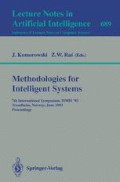Abstract
We present a natural and realistic knowledge acquisition and processing scenario. In the first phase a domain expert identifies deduction rules where he thinks that they are good indicators of a specific target concept to occur. Then, in a second knowledge acquisition phase, a learning algorithm automatically adjusts, corrects and optimizes the deterministic rule hypothesis given by the domain expert by selecting an appropriate subset of the rule hypothesis and by attaching uncertainties to them. Finally, in the running phase of the knowledge base we can arbitrarily combine the learned uncertainties of the rules with uncertain factual information.
Preview
Unable to display preview. Download preview PDF.
References
K. R. Apt, H. A. Blair, and A. Walker. Towards a Theory of Declarative Knowledge. In J. Minker, editor, Foundations of Deductive Databases and Logic Programming, chapter 2, pages 89–148. Morgan Kaufmann Publishers, 1988.
J. Y. Halpern and M. O. Rabin. A Logic to Reason About Likelihood. In Proc. Annual ACM Symp on the Theory of Computing, pages 310–319, 1983.
M. J. Kearns and R. E. Schapire. Efficient Distribution-free Learning of Probabilistic Concepts. In Proc 31st IEEE Symposium on Foundations of Computer Science, pages 382–391, 1990.
B. K. Natarajan. Machine Learning. A Theoretical Approach. Morgan Kaufmann, 1991.
E. Parzen. Modern Probability Theory and its Applications. John Wiley & Sons, Inc., 1960.
E. Rich. Default Reasoning as Likelyhood Reasoning. In Proc. National Conf on Artificial Intelligence (AAAI-83), pages 348–351, 1983.
L. G. Valiant. A Theory of the Learnable. Communications of the ACM, 27(11):1134–1142, 1984.
L. G. Valiant. Learning Disjunctions of Conjunctions. In Proc. of the 9th International Joint Conference on Artificial Intelligence (IJCAI), pages 560–566, 1985.
B. Wüthrich. On the Efficient Distribution-free Learning of Rule Uncertainties and their Integration into Probabilistic Knowledge Bases. Technical Report 92–28, ECRC, 1992.
B. Wüthrich. Probabilistic Knowledge Bases. submitted to the Journal of Logic Programming, 1992. extension of Towards Probabilistic Knowledge Bases in Springer Verlag, Lecture Notes in AI, Nr 624.
Author information
Authors and Affiliations
Editor information
Rights and permissions
Copyright information
© 1993 Springer-Verlag Berlin Heidelberg
About this paper
Cite this paper
Wüthrich, B. (1993). On the learning of rule uncertainties and their integration into probabilistic knowledge bases. In: Komorowski, J., Raś, Z.W. (eds) Methodologies for Intelligent Systems. ISMIS 1993. Lecture Notes in Computer Science, vol 689. Springer, Berlin, Heidelberg. https://doi.org/10.1007/3-540-56804-2_58
Download citation
DOI: https://doi.org/10.1007/3-540-56804-2_58
Published:
Publisher Name: Springer, Berlin, Heidelberg
Print ISBN: 978-3-540-56804-9
Online ISBN: 978-3-540-47750-1
eBook Packages: Springer Book Archive

